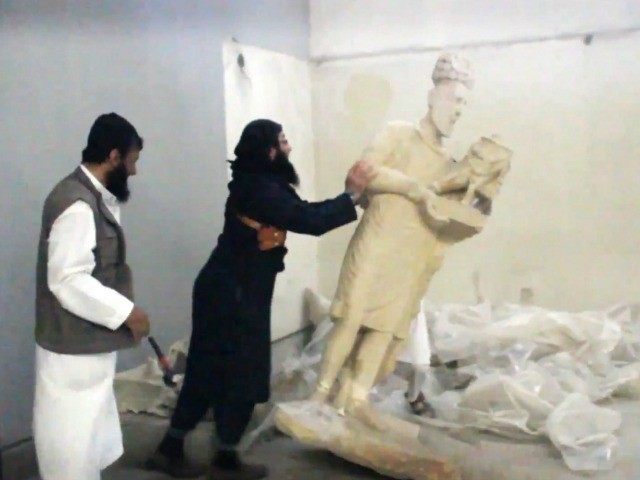The Islamic State (ISIS/ISIL) has repeatedly destroyed non-Islamic archaeological sites and ancient artifacts within their self-declared caliphate in Syria and Iraq.
Josef Yousif, the director of the Alqush Museum in Mosul, believes his museum is the next target.
“Since the fall of Saddam Hussein’s regime, we have frequently asked the Iraqi government to help us collect and protect the museum, but no efforts have been made so far,” he explained. “ISIS militants could destroy the museum as they have done in the Mosul Museum.”
ISIS recently published a video of militants destroying priceless Christian artifacts in a Mosul museum. In the past, the terrorists saved some antiques and sold them on the black market to Western dealers.
“There are all types of ancient items inside the museum ranging from old Christian dresses to ancient scripts,” said Yousif.
Terrorists ransacked all the libraries in Mosul and burned all non-Islamic books. The Central Library of Mosul was “the biggest repository of learning” in Iraq’s second-largest city. More than likely the terrorists destroyed “Iraq newspapers dating to the early 20th century, maps and books from the Ottoman Empire, and book collections contributed by about 100 of Mosul’s establishment families.” The militants then targeted the University of Mosul where they forced students to watch them burn all the science and culture textbooks.
“The birthplace of human civilisation … is being destroyed,” Kino Gabriel, a leader of the Syriac Military Council, told The Guardian. “In front of something like this, we are speechless. Murder of people and destruction is not enough, so even our civilisation and the culture of our people is being destroyed.”
The Islamic State also destroys shrines and tombs, claiming that their existence constitutes idolatry. They have also salvaged relics to sell to Western antique collectors. Antique sales pushed the group’s accounts from under $1,000 to billions.
These militants control around 4,500 archeological sites. In al-Nabuk, they stole antiques over 8,000 years old, which netted $36 million for the jihadists. Residents and gangs are allowed to loot the shrines, but they must give 20 to 50 percent of their profits to the Islamic State.
“There is no doubt that looting and illicit trade in antiquities is highly lucrative, enough for ISIS to be deeply engaged and implicated in it,” said Shawnee State University Professor Amr Al-Azm. “Stopping this illicit trade in antiquities, therefore, must be an imperative, not only because it is a major source of income for terrorist organizations like ISIS, but also because it is causing irreparable damage to Syria’s cultural heritage.”

COMMENTS
Please let us know if you're having issues with commenting.